The College of Liberal Arts is celebrating the accomplishments of our professors as they become University Distinguished Faculty. Three professors have recently accepted 2019 University awards ranking their performance among the highest and most outstanding that Colorado State University has to offer.
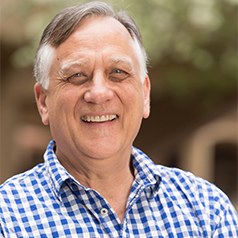
Edward Barbier
Department of Economics
University Distinguished Professor
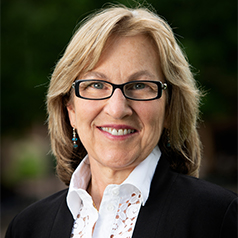
Katherine Browne
Department of Anthropology
University Distinguished Professor
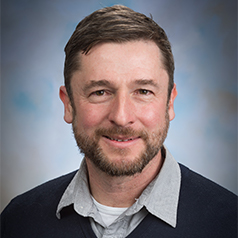
Dan Beachy-Quick
Department of English
University Distinguished Teaching Scholar
Edward Barbier

Edward Barbier, a renowned Colorado State University economist, has been named a University Distinguished Professor, CSU’s highest academic recognition.
Barbier, who joined CSU in 2017 from the University of Wyoming, is a professor in the Department of Economics and a senior scholar in the School of Global Environmental Sustainability. He is a leading environmental economist and received CSU’s 2018 Scholarship Impact Award.
“Dr. Barbier’s career record clearly ranks him among the most outstanding members of his discipline,” College of Liberal Arts Dean Ben Withers wrote in a letter endorsing Barbier’s nomination. “The letter of nomination provided by his faculty colleagues clearly outlines the global disciplinary and interdisciplinary image of his work, beginning with his seminal 1989 publication Blueprint for a Green Economy, and extending to the recent publication of his influential policy papers in the journals Science and Nature.”
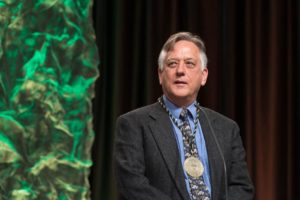
Barbier was nominated by four faculty members in the Department of Economics: Professor and Senior Associate Dean Alex Bernasek, Professor and Chair Elissa Braunstein, Associate Professor Terrence Iverson and Associate Professor Sammy Zahran.
“Professor Barbier has had a long and distinguished career in environment, natural resource and development economics,” they wrote in their nomination. “He originated some of the earliest economic approaches to ‘sustainable development,’ publishing path-breaking work in this area in the 1980s. Professor Barbier’s continuing excellence of achievements and contribution places him among the top of his discipline: He is consistently ranked among the most highly cited environmental economists and among the top 5% of all economists by citations. He is also listed as one of the 50 most influential scholars on sustainability, according to Cambridge University’s Institute of Sustainable Leadership.”
Among his most recent accomplishments are a May 2018 Science article, “How to pay for saving biodiversity,” co-authored with CSU colleagues Joanne Burgess, assistant professor of economics, and Thomas Dean, a management professor. In January, he wrote an article titled “How to make the next Green New Deal work” for Nature, in which he commented on the recent proposal for a Green New Deal from Congresswoman Alexandria Ocasio-Cortez. His new book, The Water Paradox: Overcoming the Global Crisis in Water Management, was published by Yale University Press in February.
Barbier received his undergraduate degree in economics and political science from Yale University, his M.Sc. in economics from the London School of Economics and Political Science, and his Ph.D. in economics from the University of London.
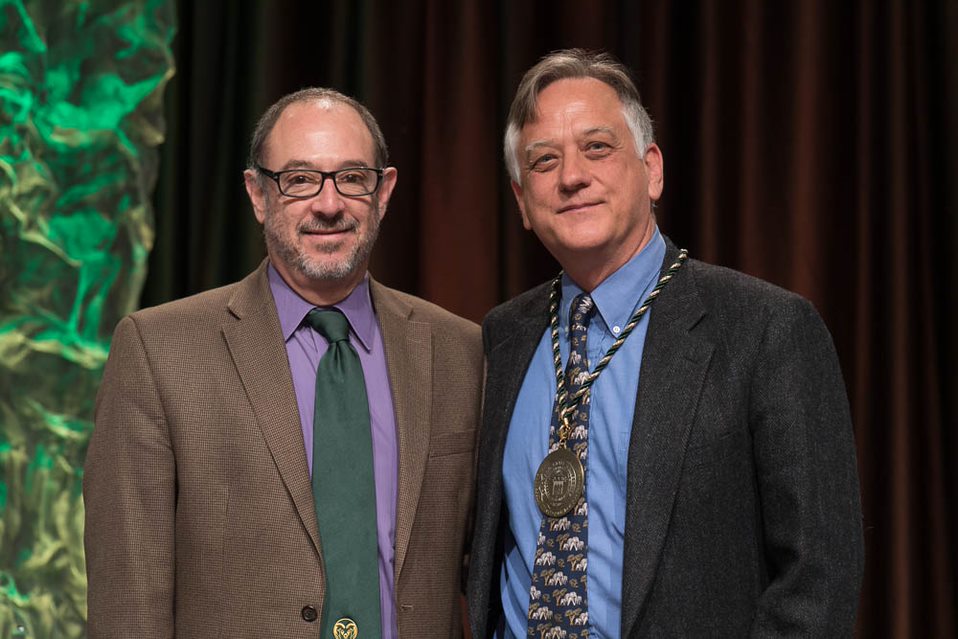
Katherine Browne
 Katherine Browne, professor of anthropology, has conducted path-breaking research in the field of cultural anthropology and has emerged as one of her discipline’s most recognized scholars. So, it is fitting that she is the first from her department – and just the fourth from the College of Liberal Arts – to be named University Distinguished Professor, CSU’s highest academic recognition.
Katherine Browne, professor of anthropology, has conducted path-breaking research in the field of cultural anthropology and has emerged as one of her discipline’s most recognized scholars. So, it is fitting that she is the first from her department – and just the fourth from the College of Liberal Arts – to be named University Distinguished Professor, CSU’s highest academic recognition.
“To me, this award acknowledges the power of liberal arts disciplines as vital players in comprehending and solving the most pressing global issues,” said Browne, a member of CSU’s Department of Anthropology since 1994. “For my part, as a cultural anthropologist, I study communities that are impacted by disasters intensified by climate change. I began this work in Louisiana after Katrina. My current post-Hurricane Harvey work in Texas focuses on perceptions of risk among city dwellers, coastal townspeople, cattle ranchers and cotton farmers.”
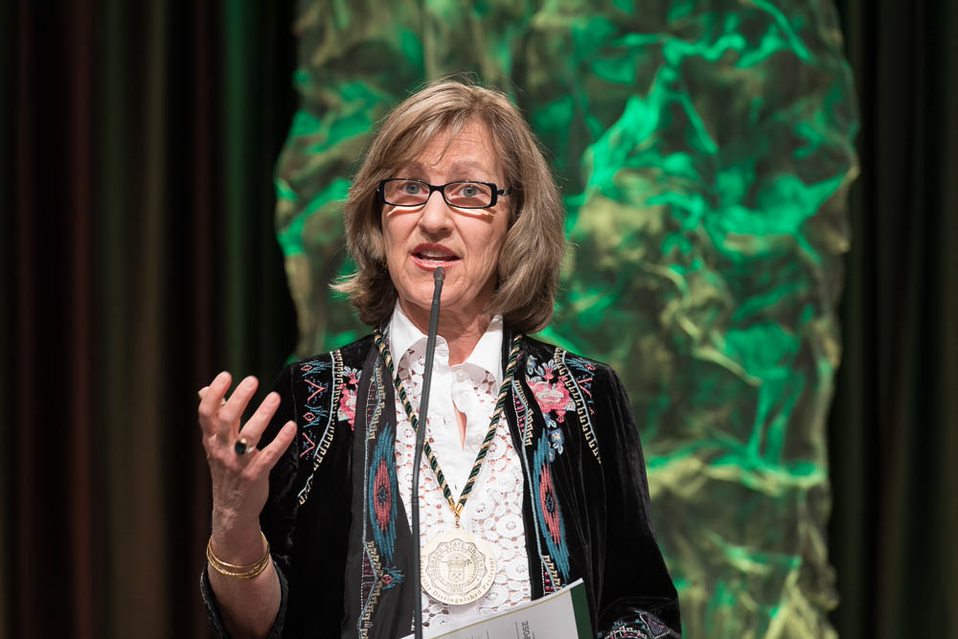 Browne has emerged as a leading voice in the public discourse of disaster, addressing in particular how the distribution of resources in a society can alter disaster’s lasting impacts, and how cultural factors figure into recovery. Her research with an African-American family of 150 and their efforts to reclaim their pre-hurricane lives resulted first in her 2007 film Still Waiting: Life After Katrina, funded by the National Science Foundation. After six more years of study, she published her book, Standing in the Need: Culture, Comfort, and Coming Home After Katrina.
Browne has emerged as a leading voice in the public discourse of disaster, addressing in particular how the distribution of resources in a society can alter disaster’s lasting impacts, and how cultural factors figure into recovery. Her research with an African-American family of 150 and their efforts to reclaim their pre-hurricane lives resulted first in her 2007 film Still Waiting: Life After Katrina, funded by the National Science Foundation. After six more years of study, she published her book, Standing in the Need: Culture, Comfort, and Coming Home After Katrina.
“In the process of documenting the Johnson-Fernandez family in St. Bernard Parish, I learned how the cultural disconnect between outside institutions like FEMA and the needs of local people led to immense suffering. It galvanized me,” Browne said. “I started writing op-eds and speaking in public forums – anything I could to communicate what I had learned to more people.”
More recently, Browne’s leadership in bringing together academics and practitioners through the Culture and Disaster Action Network (CADAN) has focused on changing disaster practice and policy by integrating cultural knowledge. With her CADAN collaborators, Browne’s research formed the basis for a 2019 FEMA report that diagnosed the paralysis in U.S. preparedness efforts and offered a culture-based approach as a more effective and sustainable solution.
Browne’s work has earned the attention and respect of her peers in anthropology. The substance and reach of her scholarship earned her the 2018 Franz Boas Award for Exemplary Service to Anthropology, considered the “Nobel Prize for anthropologists.”
“Kate’s record speaks for itself – its depth and breadth are staggering – from NSF-funded research, two detailed ethnographies in book format, high-impact articles, NPR interviews, and two documentary films,” said Mica Glantz, head of the Department of Anthropology. “What distinguishes her from other highly productive scholars is that she has made it a priority to communicate her findings not only to the subjects of her research, but also to the public and to our government. She is a true public scholar.”
Browne has received both The Ann Gill Excellence in Teaching Award and the Best Teacher Award. In keeping with her integrated approach to research and teaching, Browne will launch the nation’s first field school for the study of risk and disaster, a collaboration with Texas A&M-Corpus Christi. At the school, CSU students will have direct experience conducting ethnographic and geospatial research in an area still recovering from the effects of Hurricane Harvey.
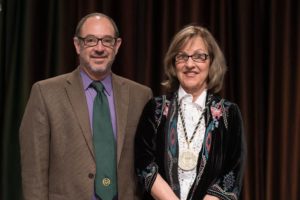
“Her work, and now the work of the field school, becomes part of multi-disciplinary efforts to consult and recommend new and better ways our society can improve its protocols for mitigating risk and building resilience for recovering from disaster,” said Glantz. “That’s why her work is so important.”
Browne noted that when scholars in human-centered disciplines join forces with their colleagues in the natural and technical sciences, they become a force for change, a force for good.
“We absolutely need the assembled power of all kinds of expertise, both to recognize the fullness of a problem and to then imagine solutions that embrace that fullness.”
Dan Beachy-Quick

Dan Beachy-Quick, a professor and assistant chair in the Department of English, has been named a University Distinguished Teaching Scholar for his outstanding accomplishments at Colorado State University.
Beachy-Quick, one of only three College of Liberal Arts faculty members to have been named a Monfort Professor, is an award-winning poet, author and teacher who oversees undergraduate education in the Department of English.
A Guggenheim Fellow, Beachy-Quick has been awarded a Creative Arts Fellowship at Harvard University and has been invited as a guest professor to the Iowa Writers’ Workshop, Yale University and many other institutions around the world.
Among his colleagues, Beachy-Quick is known as an exceptional teacher dedicated to his students and his profession. He has an unparalleled record of curricular innovation through the creation of new courses, new programs and service to the department.
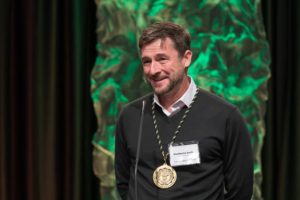 Following being named a Monfort Professor in 2013, Beachy-Quick set out to become a teacher who offers his students access to classes in ancient literature translation. After gaining a proficiency in Classical Greek and reading through much of the 300-volume Loeb Classical Library, he designed transformative course offerings for students on the foundational works of Western civilization.
Following being named a Monfort Professor in 2013, Beachy-Quick set out to become a teacher who offers his students access to classes in ancient literature translation. After gaining a proficiency in Classical Greek and reading through much of the 300-volume Loeb Classical Library, he designed transformative course offerings for students on the foundational works of Western civilization.
English Department Professor and Chair Louann Reid and Assistant Professor Zach Hutchins said in their nomination letter that Beachy-Quick’s impact on students is significant. They said his students so deeply internalize the lessons in his courses on Homer’s Iliad. His students also read the classical tragedians in the course: Aeschylus, Sophocles and Euripides.
One former student said: “What distinguishes Dan Beachy-Quick as a teacher is his empathy. This applies to his interactions with students, but also to his treatment of student work. Regardless of stylistic difference, Dan is able to intuit and adapt himself to the essence of a project and help his students magnify what is most true and real about their writing and their process.”
Additionally, Beachy-Quick’s Monfort Professorship led to the Crisis and Creativity Symposium, a radical experiment in the power of interdisciplinary collaboration. The symposium sought ways to reinvigorate the conversation between the arts, humanities, social sciences and sciences.
Results of the symposium included: a research grant to create an art installation on species extinction; performance art delivered at the Warner College of Natural Resources; and an interdisciplinary course – The Thinking Hand – that examines different types of media for art, such as words and clay, and seeks to discover curious grounds of overlap and reciprocity.
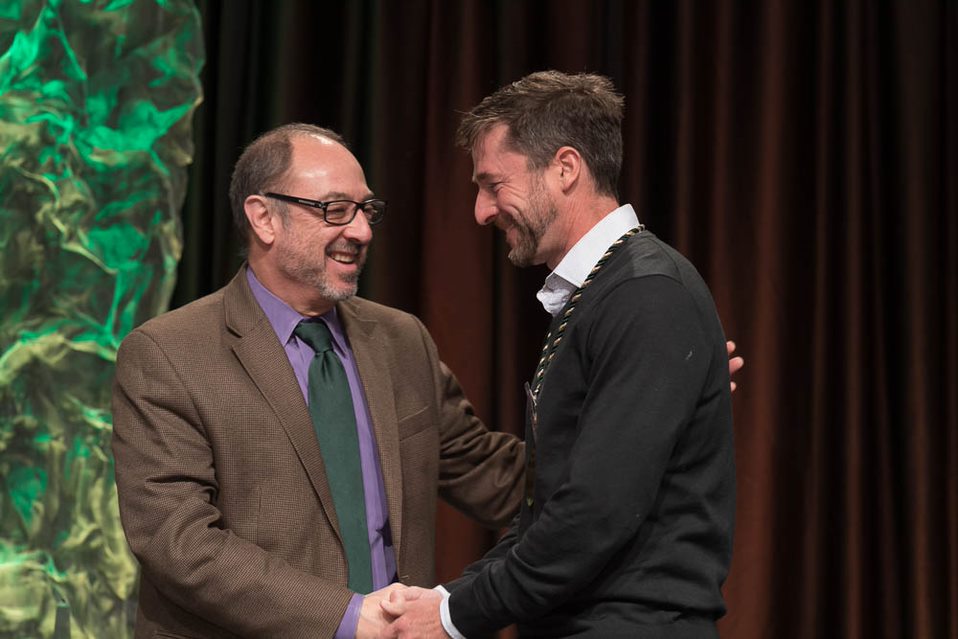
Beachy-Quick also is a prolific and accomplished writer of multiple genres – poetry, essay, fiction. His list of publications spans eight pages of his curriculum vitae, which includes eight collections of poetry, a novel and a book about English poet John Keats, among others.
“What sets Professor Beachy-Quick apart is that he is an incomparable proponent for the core values of the University, what he calls the ‘serious play’ that lurks at the roots of our intellectual lives,” said Ben Withers, dean of the College of Liberal Arts. “A poet by profession, he possesses the unparalleled ability to translate the prose of everyday academic pursuits into a higher, more measured and revealing language.”
The College of Liberal Arts also has two other University Distinguished Professors, Department of Philosophy professor Bernie Rollins, and Department of Art and Art History emeritus professor Philip Risbeck.